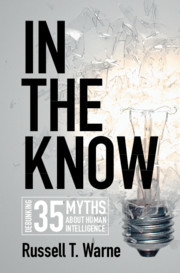In the Know Debunking 35 Myths about Human Intelligence
Langue : Anglais
Auteur : Warne Russell T.

Out with the myths and in with the truth. Learn what intelligence really means from a qualified expert.
Emotional intelligence is an important trait for success at work. IQ tests are biased against minorities. Every child is gifted. Preschool makes children smarter. Western understandings of intelligence are inappropriate for other cultures. These are some of the statements about intelligence that are common in the media and in popular culture. But none of them are true. In the Know is a tour of the most common incorrect beliefs about intelligence and IQ. Written in a fantastically engaging way, each chapter is dedicated to correcting a misconception and explains the real science behind intelligence. Controversies related to IQ will wither away in the face of the facts, leaving readers with a clear understanding about the truth of intelligence.
Introduction; Section 1. The Nature of Intelligence: 1. Intelligence is whatever collection of tasks a psychologist puts on a test; 2. Intelligence is too complex to summarize with one number; 3. IQ does not correspond to brain anatomy or functioning; 4. Intelligence is a western concept that does not apply to non-western cultures; 5. There are multiple intelligences in the human mind; 6. Practical intelligence is a real ability, separate from general intelligence; Section 2. Measuring Intelligence: 7. Measuring intelligence is difficult; 8. Content of intelligence tests is trivial and cannot measure intelligence; 9. Intelligence tests are imperfect and cannot be used or trusted; 10. Intelligence tests are biased against diverse populations; Section 3. Influences on Intelligence: 11. IQ only reflects a person's socioeconomic status; 12. High heritability for intelligence means that raising IQ is impossible; 13. Genes are not important for determining intelligence; 14. Environmentally driven changes in IQ mean that intelligence is malleable; 15. Social interventions can drastically raise IQ; 16. Brain-training programs can raise IQ; 17. Improvability of IQ means intelligence can be equalized; Section 4. Intelligence and Education: 18. Every child is gifted; 19. Effective schools can make every child academically proficient; 20. Non-cognitive variables have powerful effects on academic achievement; 21. Admissions tests are a barrier to college for underrepresented students; Section 5. Life Consequences of Intelligence: 22. IQ scores only measure how good someone is at taking tests; 23. Intelligence is not important in the workplace; 24. Intelligence tests are designed to create or perpetuate a false meritocracy; 25. Very high intelligence is not more beneficial than moderately high intelligence; 26. Emotional intelligence is a real ability that is helpful in life; Section 6. Demographic Group Differences: 27 Males and females have the same distribution of IQ scores; 28. Racial/ethnic group IQ differences are completely environmental in origin; 29. Unique influences operate on one group's intelligence test scores; 30. Stereotype threat explains score gaps among demographic groups; Section 7. Societal and Ethical Issues: 31. Controversial or unpopular ideas should be held to a higher standard of evidence; 32. Past controversies taint modern research on intelligence; 33. Intelligence research leads to negative social policies; 34. Intelligence research undermines the fight against inequality; 35. Everyone is about as smart as I am; Conclusion.
Russell T. Warne is Associate Professor of Psychology at Utah Valley University, and an educational psychologist. He is the author of the successful textbook for undergraduates Statistics for the Social Sciences (Cambridge, 2018).
Date de parution : 10-2020
Ouvrage de 434 p.
15.2x22.6 cm
Disponible chez l'éditeur (délai d'approvisionnement : 14 jours).
Prix indicatif 28,98 €
Ajouter au panierDate de parution : 10-2020
Ouvrage de 434 p.
15.8x23.4 cm
Disponible chez l'éditeur (délai d'approvisionnement : 14 jours).
Prix indicatif 101,56 €
Ajouter au panierThème d’In the Know :
© 2024 LAVOISIER S.A.S.



